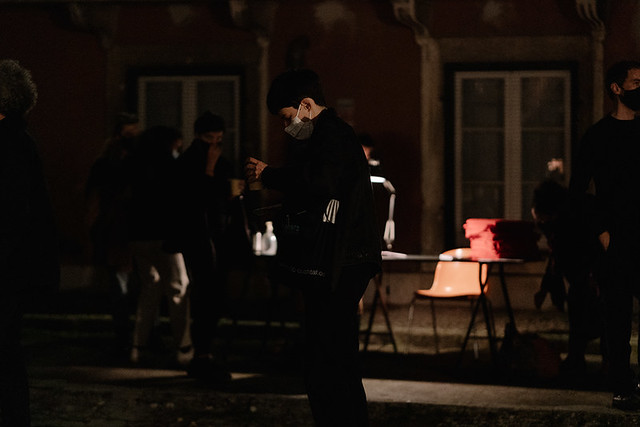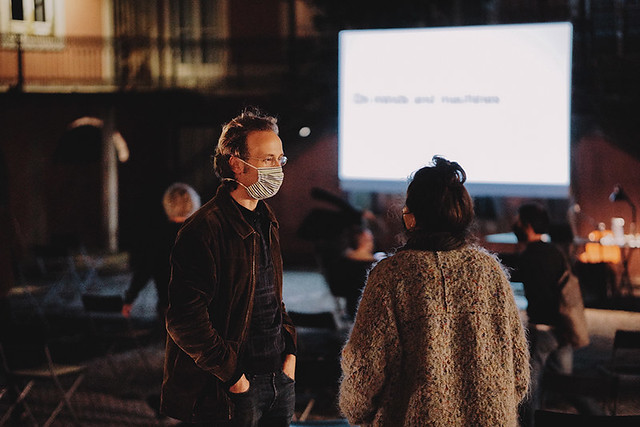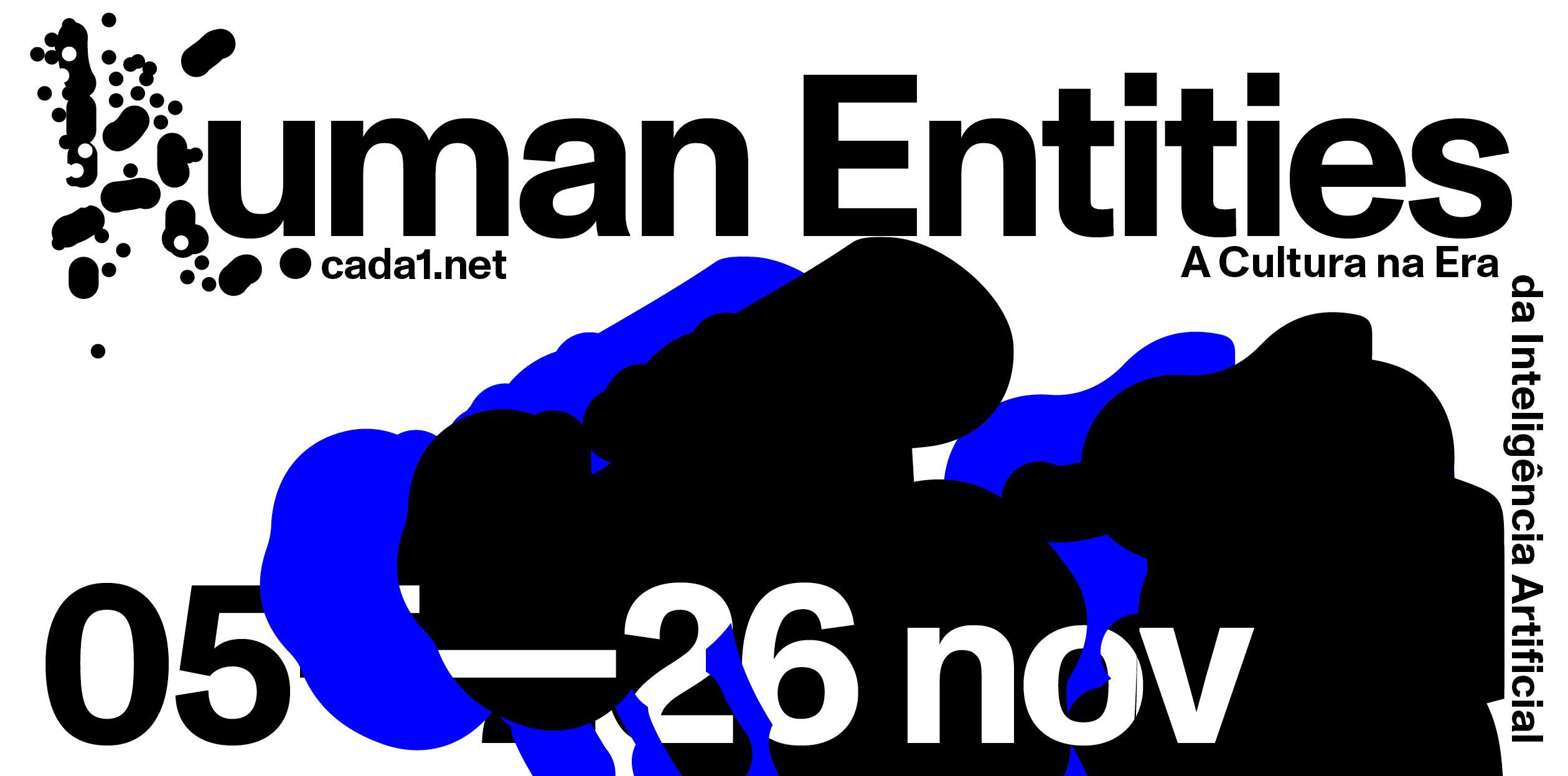
Human Entities 2020: a cultura na era da inteligência artificial
4ª edição
Programa de conversas, novembro 2020
Organização CADA em parceria com a Trienal de Arquitectura de Lisboa
Entrada livre, mediante registo
As conversas serão em língua inglesa
[English below]
Sinopse
Durante a pandemia assistimos a uma aceleração da incursão da tecnologia na vida quotidiana. Contudo, depois de anos de reivindicações grandiosas sobre soluções tecnológicas para todos os problemas do mundo, a resposta geral dos gigantes tecnológicos ao vírus foi mais do que decepcionante. Enquanto muitos governos nacionais lutam para enfrentar esta crise, os ganhos de Silicon Valley continuam a exceder todas as expectativas.
Estes são tempos estranhos – e este é um momento de particular transição. Mas mesmo antes da covid-19, era frequentemente afirmado que estávamos a viver uma mudança fundamental. Este já era um período no qual um conjunto de desafios, acima de tudo a destruição ambiental, nos forçava a reconhecer que muitos dos nossos valores dominantes são insustentáveis. Num tempo de mudança tecnológica, as crises políticas e o aumento dos desequilíbrios societais, continuam a provar que muitos dos nossos sistemas complexos estão no limite da sua reprodutibilidade – as relações entre humanos e entre estes e o seu ambiente necessitam de renegociação urgente.
E no entanto, em todo o mundo vemos uma multitude de experiências e processos positivos onde governos locais, cidadãos, empresas e universidades se estão a juntar em torno de iniciativas inovadoras a nível local mas com potencial de relevância à escala nacional e global. No meio da crise actual, novas ideias estão a emergir em todo o lado.
Assim, talvez este seja também um tempo para atender ao próprio processo de mudança, embora sabendo que a transformação social envolve complexas configurações de atores. Em relação à tecnologia, embora seja difícil examinar tais configurações – pois, como sabemos, as estruturas através das quais vemos a tecnologia são em si mesmas tecnologicamente mediadas – devemos usar este tempo para parar e reconhecer o nosso próprio envolvimento na perpetuação de normas sociais e culturais insustentáveis.
Finalmente, neste estado de crescente incerteza, talvez possamos também fazer uma pausa para considerar de que forma pode esta condição ser entendida como um factor para transformações positivas na sociedade, tecnologia, economia e no comportamento das pessoas. Apesar da sensação temporária que muitos de nós têm de estar presos no presente, talvez possamos também reflectir sobre como adoptar uma maior aceitação da incerteza, uma que nos permita avançar em direção a futuros mais desejáveis.
CADA (Sofia Oliveira/Jared Hawkey)
Human Entities é um ciclo de conversas focado na mudança tecnológica e nos seus impactos – nas formas como a cultura e a tecnologia se influenciam mutuamente.
Quarta, 4 de novembro 2020, 18.30
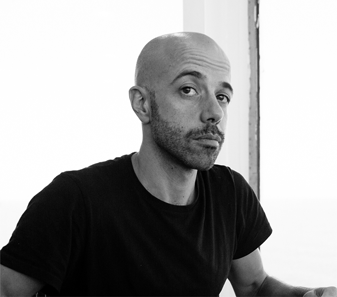
navegando o nevoeiro urbano: sobre adaptação urbana
Andrea Pavoni
Investigador DINÂMIA’CET ISCTE-IUL
A conversa mergulha na atmosfera impalpável da vida urbana quotidiana, aquela através da qual respiramos, experimentamos, e sentimos a cidade. Em tempos de capitalismo estético, política de medo, computação ubíqua e doenças transmitidas pelo ar, este background inconspícuo tornou-se o campo de batalha da política urbana. Tecnologias digitais, imaginários de marca e regulamentos normativos entrelaçam-se cada vez mais neste quotidiano nebuloso, afectando profundamente a forma corpórea, emocional e intelectual através da qual navegamos a cidade.
Como dar sentido a esta contínua reconfiguração da experiência urbana? Três dimensões podem ser destacadas: o imperativo da adaptação no centro da ideologia neoliberal; a política de conforto que orienta a engenharia de atmosferas seguras e agradáveis na cidade; e a delegação sistémica de competências urbanas intelectuais, emocionais e éticas a proxies tecno-jurídicos, alimentando a estupidez funcional, a ansiedade social, e a desorientação existencial. Depois de desvelar a sua composição e as suas consequências políticas, a conversa terminará, tentando gesticular formas de experimentar o contrário.
Andrea Pavoni
Andrea Pavoni é investigador no DINÂMIA’CET ISCTE-IUL, Instituto Universitário de Lisboa. Na intersecção entre a geografia crítica, teoria social e filosofia, a sua investigação explora a relação entre materialidade, normatividade e estética no contexto urbano. É editor da Law and the Senses Series (University of Westminster Press) e editor associado da revista Lo Squaderno, Explorations in Space and Society. O seu livro, Controlling Urban Events. Law, Ethics and the Material, foi editado na Routledge.
Link:
https://www.dinamiacet.iscte-iul.pt/research-team/Andrea-Pavoni
A conversa será em língua inglesa e seguida de uma sessão de Q&A moderada por Simone Tulumello.
Quinta, 12 de novembro 2020, 18.30

Sistemas fluviais e o corpo molecular
Margarida Mendes
Curadora, investigadora e activista
Podemos traçar o perímetro exacto da cartografia molecular de um rio e estimar o alcance que as consequências destes sistemas de fluxo catalítico têm, dentro e fora dos corpos vivos? Os sistemas fluviais e infra-estruturas circundantes são enormes sistemas hidrogeológicos, químicos e electromagnéticos, que conectam habitantes e ecossistemas através de um fluxo irreverente de descargas e movimentos, que os seres humanos tentam domar através de direitos de caudal e projetos de restauração costeira. Deste modo, as infra-estruturas aquáticas e fluviais são pontos de partida essenciais para a análise de sistemas, e reflexão sobre os corpos e ecossistemas, da escala molecular à escala planetária. Tentando compreender a ligação entre caudal fluvial, ruído, toxicidade e industrialização, irei focar-me nos habitats do rio Mississippi e do rio Tejo, questionando de que forma o nível de ruído de fundo e o desequilíbrio químico podem estar ligados a perturbações endocrinológicas. Ao investigar a continuidade química e vibracional entre o corpo e o ambiente, especularei sobre como diferentes ontologias e mecanismos sensoriais poderão ser necessários para possibilitar um debate mais profundo sobre ecossistemas ameaçados.
Margarida Mendes
Margarida Mendes é curadora, investigadora e activista. A sua pesquisa ─ com enfoque no cruzamento da cibernética, filosofia, ecologia e filme experimental ─ explora as transformações dinâmicas do ambiente e o seu impacto nas estruturas sociais e no campo da produção cultural. Integrou na equipa curatorial da 11ª Bienal de Gwangju (2016), 4ª Bienal de Design de Istambul (2018) e 11ª Bienal de Liverpool (reagendado para 2021). Em 2019, lançou a série de exposições Plant Revolution! (CIAJG, Museo La Tertulia), que questiona o encontro interespécies explorando diferentes narrativas de mediação tecnológica, e em 2016, curou a exposição Matter Fictions, no Museu Berardo, publicando um livro na Sternberg Press. É consultora de ONGs ambientalistas que trabalham sobre a mineração no mar profundo e dirigiu também diversas plataformas educacionais, como escuelita, uma escola informal do Centro de Arte Dos de Mayo ─ CA2M, Madrid (2017); O espaço de projectos The Barber Shop em Lisboa dedicado à pesquisa transdisciplinar (2009-16); e a plataforma de pesquisa curatorial sobre ecologia The World In Which We Occur/Matter in Flux (2014-18). Margarida Mendes é doutoranda no Centre for Research Architecture, Visual Cultures Department, Goldsmiths University of London e colabora frequentemente com o canal online de vídeo reportagem Inhabitants-tv.org.
Links:
http://goldsmiths.academia.edu/MargaridaMendes
https://soundcloud.com/margaridamendes
http://www.twwwo.org
A conversa será em língua inglesa e seguida de uma sessão de Q&A.
Quinta, 19 de novembro 2020, 18.30
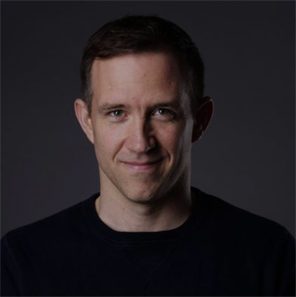
Sobre mentes e máquinas
Joe Paton
Neurocientista computacional, director do Programa de Neurociência Champalimaud
Quer os cérebros quer os computadores efetuam cálculos, mas na sua maioria, a semelhança acaba aqui. Os sistemas nervosos têm evoluído ao longo das últimas centenas de milhões de anos para suportar a sobrevivência dos organismos em que se situam. Os computadores feitos pelo homem existem devido às inovações teóricas e técnicas do século XX, e são impotentes sem as nossas instruções explícitas. Esta conversa explora algumas das características da estrutura e função do sistema nervoso, destacando as suas diferenças e semelhanças quando comparadas com computadores e com os modernos algoritmos para machine learning e inteligência artificial.
Joe Paton
Joe Paton, Ph.D., é um neurocientista computacional e director do Programa de Neurociência Champalimaud na Fundação Champalimaud em Lisboa e co-director do Curso de Formação Avançada em Neurociência Computacional da FENS-Cajal. Originalmente formado como biólogo, fez o seu doutoramento em Neurobiologia e Comportamento na Universidade de Columbia. O seu laboratório de investigação foca-se na compreensão dos algoritmos e mecanismos de circuitos neurais subjacentes ao comportamento inteligente e adaptativo.
Link:
http://neuro.fchampalimaud.org/en/person/115/
A conversa será em língua inglesa e seguida de uma sessão de Q&A.
Quinta, 26 de novembro 2020, 18.30
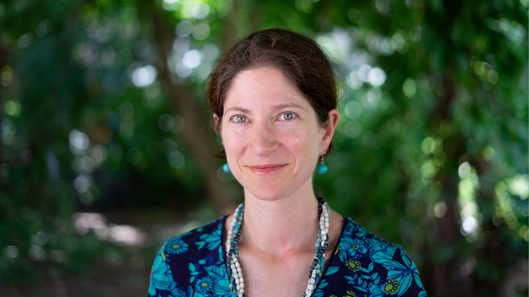
Crescimento verde ou Decrescimento: ação climática e prosperidade humana
Julia Steinberger
Professora de Economia Ecológica, Universidade de Lausana
Novos estudos de economia ecológica mostram que precisamos rapidamente de decrescer fisicamente as nossas economias para evitar os piores efeitos da ruptura climática. O crescimento verde pode ter sido, na melhor das hipóteses, um sonho, e na pior, uma narrativa concebida para atrasar a ação. O que significa isto para o bem-estar humano e a ação política?
Julia Steinberger
A Prof. Julia Steinberger investiga e ensina nas áreas interdisciplinares da Economia Ecológica e da Ecologia Industrial na Universidade de Lausana (anteriormente Universidade de Leeds). A sua investigação examina as ligações entre a utilização de recursos (energia e materiais, emissões de gases com efeito de estufa) e a performance societal (atividade económica e bem-estar humano). Está interessada em quantificar as ligações actuais e históricas entre utilização de recursos e parâmetros socioeconómicos, e identificar vias alternativas de desenvolvimento para orientar a transição necessária para uma sociedade de baixo carbono. Venceu o Prémio Leverhulme Research Leadership com o seu projecto de investigação ‘Living Well Within Limits’ que investiga como o bem-estar humano universal pode ser alcançado dentro dos limites planetários. Ela é Autora Principal do 6º Relatório de Avaliação do Painel Intergovernamental sobre Alterações Climáticas (IPCC) com o Grupo de Trabalho 3.
Links:
https://environment.leeds.ac.uk/see/staff/1553/professor-julia-steinberger
https://profjuliasteinberger.wordpress.com
https://medium.com/@JKSteinberger
https://twitter.com/JKSteinberger
A conversa será em língua inglesa e seguida de uma sessão de Q&A.
ENGLISH
Human Entities 2020: culture in the age of artificial intelligence
Fourth edition
Programme of public talks, November 2020
Organised by CADA in partnership with the Lisbon Architecture Triennale
All welcome, free admission; booking required
Talks in English
Overview
During the pandemic we’ve seen the encroachment of technology into everyday life accelerate. Yet after years of grandiose claims about technological solutions to all the world’s problems, general responses to the virus by the tech giants remain more than disappointing. While many national governments struggle to cope, the earnings of Silicon Valley continue to exceed all expectations.
These are strange times ─ and this is a particularly transitional moment. But even before covid-19, it was often said that we were living through fundamental change. This was already a period in which a set of challenges, above all environmental destruction, was forcing us to recognise that many of our dominant values are unsustainable. In the context of technological change, political crises and deepening societal imbalances continue to prove that many of our complex systems are at the limit of their reproducibility ─ the relationships both between humans and humans and their environment need urgent renegotiation.
And yet around the world we see a multitude of positive experiments and processes where local government, citizens, businesses and universities are coming together to engage in novel initiatives at the local level which may also have relevance at a national and global scale. Amid the current crisis new thinking is emerging everywhere.
Perhaps then, this is also the time in which we should attend to the process of change itself, although recognising that social transformations are characterised by complex configurations of actors. With respect to technology, while it is hard to examine such configurations ─ because, as we know, the frameworks through which we view technology are technologically mediated themselves ─ we should use this time to pause and acknowledge our own involvement in perpetuating untenable social and cultural norms.
Finally, in a state of growing uncertainty, maybe we could also stop to consider how this condition could be a driver for positive transformations in society, technology, economics and in the behaviour of people. Despite the temporary sense many have of being trapped in the present, we might also reflect on how to adopt a greater acceptance of uncertainty, one which will allow us to edge towards more desirable futures.
CADA (Sofia Oliveira/Jared Hawkey)
Human Entities is a series of talks focused on technological change and its impacts – the ways culture and technology shape and influence each other.
Wednesday 4 November 2020, 18.30

navigating the urban fog: on urban adaptation
Andrea Pavoni
Research fellow at DINÂMIA’CET, Instituto Universitário de Lisboa, Portugal
The talk dives into the impalpable atmosphere of everyday urban life, through which we breathe, experience, and feel the city. In times of aesthetic capitalism, politics of fear, ubiquitous computing, and airborne diseases, this inconspicuous background has become the battleground of urban politics. Digital technologies, branded imaginaries and normative regulations increasingly weave into this hazy everyday, deeply affecting the corporeal, emotional and intellectual paths through which we navigate the city.
How to make sense of this ongoing reconfiguration of urban experience? Three dimensions may be highlighted: the imperative of adaptation at the core of neoliberal ideology; the politics of comfort informing the engineering of safe and pleasurable atmospheres in the city; and the systemic delegation of intellectual, emotional and ethical urban skills to techno-legal proxies, that feeds functional stupidity, social anxiety, and existential disorientation. After unpacking their composition and the political consequences thereof, the talk will conclude, tentatively, by gesturing towards ways to experience the urban otherwise.
Andrea Pavoni
Andrea Pavoni is a research fellow at DINÂMIA’CET, Instituto Universitário de Lisboa, Portugal. Unfolding at the intersection between critical geography, social theory, and philosophy, his research explores the relation between materiality, normativity and aesthetics in the urban context. He is editor of the Law and the Senses Series (University of Westminster Press) and associate editor of the journal Lo Squaderno, Explorations in Space and Society. His book, Controlling Urban Events. Law, Ethics and the Material, is out on Routledge.
Link:
https://www.dinamiacet.iscte-iul.pt/research-team/Andrea-Pavoni
The talk will be in English and followed by a Q&A session moderated by Simone Tulumello.
Thursday 12 November 2020, 18.30

River systems and the molecular body
Margarida Mendes
Curator, researcher and activist
Can we actually trace the exact perimeter of a river’s molecular cartography and the extent of the consequences that these systems of catalytic flux have within and outside living bodies? River systems and their surrounding infrastructures are enormous hydrogeological, chemical and electromagnetic systems that connect their surrounding inhabitants and ecosystems through an irreverent flux of discharges and motions that humans attempt to tame through flowage rights and coastal restoration projects. Hence, aquatic and riverine infrastructures are essential points of departure for system analysis and reflection about the bodies and ecosystems, from the molecular through to the planetary scale. In attempting to understand the connection between river flux, noise, toxicity, and industrialization, I will focus on the habitats of the Mississippi and the Tagus rivers, questioning how the level of background noise and chemical imbalance may be connected with endocrinological disruptions. By investigating the chemical and vibrational continuity between bodies and the environment, I will speculate how different ontologies and mechanisms for sensing and registry might be needed, in order to provide a deeper debate about ecosystems under distress.
Margarida Mendes
Margarida Mendes’s research explores the overlap between cybernetics, ecology and experimental film, investigating environmental transformations and their impact on societal structures and cultural production. She is interested in exploring alternative modes of education and political resilience through her collaborative practice, programming, and activism. She was part of the curatorial team of the 11th Gwangju Biennale (2016), 4th Istanbul Design Biennial (2018), and 11th Liverpool Biennial (rescheduled for 2021). In 2019 she launched the exhibition series Plant Revolution! which questions the interspecies encounter while exploring different narratives of technological mediation and in 2016 curated Matter Fictions, publishing a joint reader with Sternberg Press. She is a consultant for environmental NGOs working on marine policy and deep sea mining and has directed several educational platforms, such as escuelita, an informal school at Centro de Arte Dos de Mayo – CA2M, Madrid (2017); The Barber Shop project space in Lisbon dedicated to transdisciplinary research (2009-16); and the ecological inquiry curatorial research platform The World In Which We Occur/Matter in Flux, (2014-18). She is a PhD candidate at the Centre for Research Architecture, Visual Cultures Department, Goldsmiths, University of London with the project “Deep Sea Imaginings” and is a frequent collaborator on the online channel for exploratory video and documentary reporting Inhabitants-tv.org.
Links:
http://goldsmiths.academia.edu/MargaridaMendes
https://soundcloud.com/margaridamendes
http://www.twwwo.org
The talk will be in English and followed by a Q&A session.
Thursday 19 November 2020, 18.30

On minds and machines
Joe Paton
Computational neuroscientist, director of the Champalimaud Neuroscience Programme
Brains and computers both perform computations, yet for the most part, their similarity ends there. Nervous systems have evolved over the last several hundred million years to support the survival of organisms in which they are situated. Man made computers exist due to theoretical and technical innovations of the 20th century, and are powerless without our explicit instruction. This talk will explore some of the features of nervous system structure and function, highlighting their differences and similarities when compared to computers and modern computer algorithms for machine learning and artificial intelligence.
Joe Paton
Joe Paton, Ph.D., is a computational neuroscientist and director of the Champalimaud Neuroscience Programme at the Champalimaud Foundation in Lisbon, PT and co-director of the FENS-Cajal Advanced Training Course in Computational Neuroscience. Originally trained as a biologist, he received his doctoral degree in Neurobiology and Behavior from Columbia University. His research laboratory focuses on understanding the algorithms and neural circuit mechanisms underlying intelligent, adaptive behavior.
Link:
http://neuro.fchampalimaud.org/en/person/115/
The talk will be in English and followed by a Q&A session.
Thursday 26 November 2020, 18.30

Human Entities 2020: culture in the age of artificial intelligence
Fourth edition
Thur 26 November 2020, 18.30
All welcome, free admission; booking required
Green growth or Degrowth: climate action and human prosperity
Julia Steinberger
Professor of Ecological Economics, University of Lausanne
New research from ecological economics shows that we need to rapidly physically degrow our economies to avoid the worst effects of climate breakdown. Green growth might have been at best a dream, at worst a narrative designed to delay action. What does this mean for human well-being and political action?
Julia Steinberger
Prof. Julia Steinberger researches and teaches in the interdisciplinary areas of Ecological Economics and Industrial Ecology at the University of Lausanne (previously University of Leeds). Her research examines the connections between resource use (energy and materials, greenhouse gas emissions) and societal performance (economic activity and human wellbeing). She is interested in quantifying the current and historical linkages between resource use and socioeconomic parameters, and identifying alternative development pathways to guide the necessary transition to a low carbon society. She is the recipient of a Leverhulme Research Leadership Award for her research project ‘Living Well Within Limits’ investigating how universal human well-being might be achieved within planetary boundaries. She is Lead Author for the Intergovernmental Panel on Climate Change’s (IPCC) 6th Assessment Report with Working Group 3.
Links:
https://environment.leeds.ac.uk/see/staff/1553/professor-julia-steinberger
https://profjuliasteinberger.wordpress.com
https://medium.com/@JKSteinberger
https://twitter.com/JKSteinberger
The talk will be in English and followed by a Q&A session.
Local: Trienal de Arquitectura de Lisboa, Campo de Santa Clara, 142-145, 1100-474, Lisboa. Evento ao ar livre
Venue: Lisbon Architecture Triennale, Campo de Santa Clara, 142-145, 1100-474 Lisbon, Portugal. Open-air event.
Organização CADA em parceria com a Trienal de Arquitectura de Lisboa
Organised by CADA in partnership with the Lisbon Architecture Triennale
Financiamento/Funded by: República Portuguesa – Cultura | Direção-Geral das Artes
Apoio/Supported by: Câmara Municipal de Lisboa, NOVA LINCS e/and ISCTE-IUL
Design: Marco Balesteros (LETRA)
Fotografia/Photography: Joana Linda
Técnico de som e captação audio/Sound recording: Ivan Barbosa
Agradecimentos/Acknowledgement


